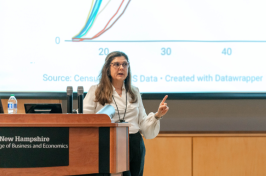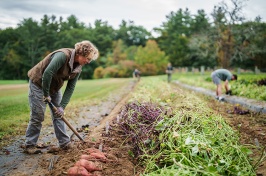A Recipe for Feeding Ourselves: New Hampshire’s First-Ever Food System Strategic Plan is Underway

DURHAM, N.H. — Granite Staters will have an easier time accessing locally grown and caught foods, thanks to a new effort by the NH Food Alliance, a food system-focused community outreach program of the Sustainability Institute at the University of New Hampshire, and the NH Department of Agriculture, Markets and Food. Experts at UNH and other food system organizations have been tapped to develop the first strategic plan in support of farmers, fishermen and consumers.
The NH Food and Agriculture Strategic Plan will provide a holistic view of the state’s agricultural and seafood industries and establish a roadmap for continued growth and stability in both sectors. Spearheaded by the NH Food Alliance, in partnership with the NH Department of Agriculture, Markets and Food, UNH Extension, the NH Agricultural Experiment Station and more than 30 other food system organizations, the inaugural strategic plan will align the food community, and those who want to strengthen it, streamlining the ability to obtain funding, pass beneficial legislation, develop programs, invest in infrastructure and build networks in support of a thriving, fair and sustainable local food system in the state.
"We know we can accomplish more if we’re operating from the same playbook, ensuring that we can grow and consume more of our own food here in the Granite State,” said Nicole Cardwell, program director for the NH Food Alliance.
The NH Food and Agriculture Strategic Plan will include 27 informational briefs that closely examine the products, markets and issues pivotal to creating a thriving food system in New Hampshire. Each brief will address a specific topic, like climate resilience, meat production or food literacy and will offer specific recommendations needed to address related challenges. Authors for each brief are experts in their field, representing 89 organizations and businesses from across the state.
The NH Food Alliance is inviting the public to get involved in the planning process by providing feedback on the product, market and issue briefs during the open comment periods, which will be staggered between September and December 2024. Those interested can browse through the brief open comment period calendar on the NH Food Alliance website.
“This project is an excellent representation of UNH’s public university mission and our strategic priority to build collaborations that support New Hampshire’s economy and quality of life, sustainability and resilience and to be a trusted, valuable and consistent partner,” said Fiona Wilson, executive director of UNH’s Sustainability Institute.
Like the rest of the country, New Hampshire is reliant on a fragile and complex global supply chain to fulfill one of our most basic needs—the food we eat. A strong local food system can increase regional food security, providing additional potential benefits including economic stability for farmers and producers, regional economic growth, protected open spaces, a stable food supply, climate resilience and elevated public health and nutrition. A strong regional food system can also be a complex challenge so the new strategic plan is designed to align the hundreds of organizations and thousands of individuals working to create a stronger state food system.
The decision to create a plan for New Hampshire’s food system developed out of the NH Food Alliance’s participation in the New England Food System Planners Partnership, a collaboration between seven state-level organizations, six-state agricultural, economic and environmental department representatives and Food Solutions New England (FSNE). A 2023 report published by the partnership, titled A Regional Approach to Food System Resilience, explored what it would look like for New England to reach the goal of producing and consuming 30% of foods in the region by 2030.
Two strategies are recommended to move each state closer toward that goal: to develop a food system plan and assess how much local food is currently purchased in their state to provide a benchmark, since those numbers weren’t available. The NH Food Alliance team heeded this call by launching the development of the strategic plan and completing New Hampshire’s benchmark assessment, called the Local Food Count, in collaboration with the other New England states. New Hampshire’s Local Food Count, which is also being released today, estimates that 3.1% of the food consumed in New Hampshire was produced in the state in 2022. While promising, the hope is to establish a strategic plan that will increase this percentage and the economic viability of New Hampshire’s farmers, fisheries and food producers.
“New Hampshire is rich with agricultural resources—land and soil, dedicated farmers and food producers and deeply knowledgeable researchers and professionals who work tirelessly to ensure local food gets from our farms to the plates of Granite Staters from the North Country to the Seacoast. The NH Department of Agriculture, Markets, and Food is proud to co-lead the strategic planning process with the NH Food Alliance and is excited to see its positive impact for our farmers and the state’s food system at large,” said Shawn Jasper, commissioner of agriculture for New Hampshire.
For more information about the NH Food Alliance and the NH Food and Agriculture Strategic Plan, visit the NH Food Alliance website: https://www.nhfoodalliance.org
About UNH
The University of New Hampshire inspires innovation and transforms lives in our state, nation and world. More than 16,000 students from 50 states and 87 countries engage with an award-winning faculty in top-ranked programs in business, engineering, law, health and human services, liberal arts and the sciences across more than 200 programs of study. A Carnegie Classification R1 institution, UNH partners with NASA, NOAA, NSF, and NIH, and received over $210 million in competitive external funding in FY23 to further explore and define the frontiers of land, sea and space.
Latest News
-
May 15, 2025
-
May 14, 2025
-
May 14, 2025
-
May 6, 2025
-
April 15, 2025














































